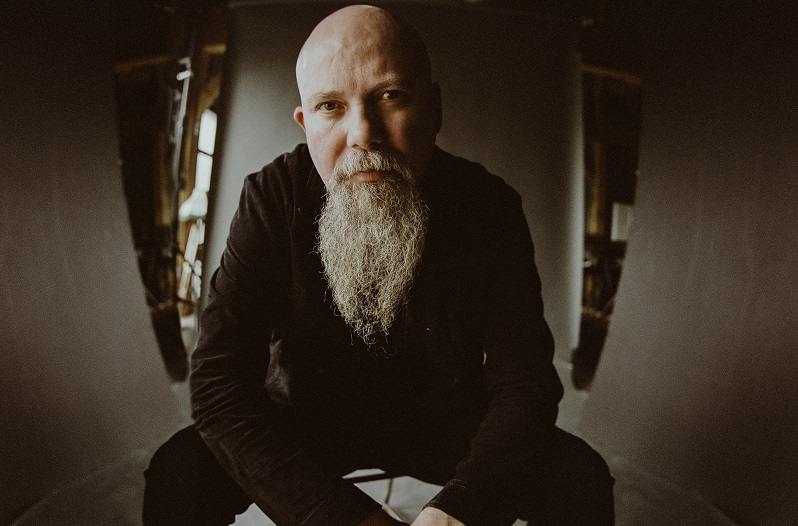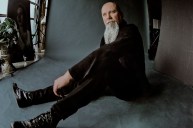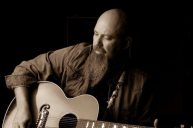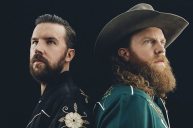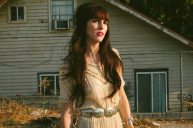Once his impressive catalog of co-writes stopped suiting country radio, Kendell Marvel had nothing to lose by revisiting his singer-songwriter past.
Marvel, a co-writer of frequent collaborator Chris Stapleton's Grammy-winning hit "Either Way," has also helped pen songs recorded by Gary Allan, Brothers Osborne, Jamey Johnson, Jake Owen, Lee Ann Womack, George Strait and Joe Diffie.
In 2017, Marvel found an audience for his own roughneck performance style with the album Lowdown & Lonesome. Since then, he's made the music he wants to hear instead of chasing commercial hits.
Marvel's departure from the mainstream continues with the Oct. 11 release of Solid Gold Sounds via album producer and Black Keys member Dan Auerbach's own Easy Eye Sound imprint.
Wide Open Country recently chatted with Marvel about collaborating with Auerbach, outgrowing party anthems and reaching a traditional country audience.
WOC: For the new album, you worked with Dan from The Black Keys. How'd you get to know him? It seems like he's pretty involved in Nashville.
Marvel: There's a guy named Clay Bradley who's been working with me. We went over to Dave Ferguson's studio. Dave does a lot of work with Dan. They produce a lot of things together, and that's where the interest started. (Ferguson) played on my last record, and he was like, "Man, let me go play this for Auerbach. See if he might be interested in this." Then they made the introduction, and we just hit it off, wrote a bunch of songs and had fun.
Did you feel like Auerbach was pretty in tune to your style of writing and your mindset as a performer?
He was totally in tune with it, but it was a totally different vibe, as well. It was totally new for me, writing with different people and different styles of writers. It was so refreshing to do something different. You know, we get old and jaded and don't even like our own songs, and then something fresh comes along like that. That's what keeps us going.
You filled that Nashville songwriter role for years after coming to Nashville to pursue a solo career. What prompted you to put yourself out there again as a singer?
Shitty music, really. What you have to write today to get on the radio... I just couldn't make myself do it. I was just tired of that one song that they seem to play over and over and the snaps and the click tracks. Just crap. Just like watered-down pop. I can't do that.
Listening to your newer songs, it's no surprise that your writing better suited the mainstream when Lee Ann Womack and George Strait dominated the charts.
Absolutely. It just changed completely. It's a young man's world, you know. They're writing about tailgates and short shorts and bonfires. I've done all of that stuff, but it's been a long time. I'm almost 50. I'm not convincing writing that kind of thing.
When you say it's a young man's game, that carries over to artists, as well. Historically, someone like Uncle Dave Macon became one of the first Opry stars when he was much older than you are now. And Mel Tillis, even though he'd been around and had some success, didn't have his first number one hit until the year he turned 40. Now, unless you're Keith Urban or someone who's been famous for over 20 years, you're probably not going to get on the charts if you're over 35.
I have no interest in country radio charts. Obviously, we're not going for anything like that. We don't have any crazy thoughts in our head: "Hey, they're going to play us on country radio!" That's not going to happen. But Brothers Osborne and Chris Stapleton still struggle. They sell out arenas, but they struggle with radio airplay. We have no preconceived notions that's going to happen for us.
It's just different. Like Ronnie Dunn, he was older when Brooks & Dunn came out. He wasn't a spring chicken. I'm not sure how old he was, but I'm sure he was in the 40 range. That'd be totally unheard of nowadays.
With the internet and Americana having its own chart and awards and such, there's ways to get your name out there and receive recognition without the traditional means of country radio.
Oh absolutely. You know, the Sturgills and Jason Isbells and Cody Jinkses of the world and Tyler Childers... Those guys are killing it live. They're making lots and lots of money and playing really cool places. Selling out Red Rocks with zero radio play. There's lots of outlets thanks to social media and digital platforms giving guys like me an outlet.
Going back to the new album, how'd you describe it to fans of your prior album, Lowdown & Lonesome?
It's way different than my last one. It's still in your face and gritty, but just the sound is more '70s. Dan, everything he does over there in his studio, every piece of gear is vintage. So, it's not like we're trying to sound vintage. It is, you know. My last record was more ZZ Top meets Waylon. This is more Charlie Rich meets Waylon.
And the musicians are totally different. These guys are the actual guys that played on "Good Time Charlie's Got the Blues" and "Pretty Woman" and "In the Ghetto." All these classic songs. They're older fellas. The youngest one saw The Beatles live, so that ought to tell you something.
Were you hearing a lot of stories from them and asking questions about Roy Orbison?
Oh absolutely. Them guys have seen it all. Nothing surprises them kind of people.
You compare your last two albums to Waylon. Is there any effort in your mind to keep from getting lumped in with the bands labeled as outlaw that sing about whiskey all the time?
Absolutely. People say outlaw. That's a pretty loose term in my book. Some of the things they say are outlaw, I don't think is. What I consider outlaw music... I'm not even sure that's a thing. I think outlaw music is something that's just left field. It's not mainstream and kind of bucks the system. Do what you want, basically, is outlaw.
But this sound and some of the lyrics have elements of what you'd think would be outlaw music, but there's a lot of love songs on this thing, too. I'm not screaming at you. It's a little more of a singer's record. I think that the people who love Cody Jinks and Sturgill Simpson will love it, and the people who love somebody who's a little more balladeery will love it. I think it can reach some pop people. People who like Adele and stuff like that.
I guess the people who are Black Keys fans and are curious about what Dan's doing will hear it and connect with that bluesy grit.
It's got some of that Black Keys guitar on it. You'll be playing with a bunch of strings and a bunch of beautiful piano melodies, and then a slide comes in with Auerbach playing some of that wacky stuff he plays. It's great. I dig it a lot.
One last question. I've got to ask about one of the album's many co-writers, John Anderson. Had you met him before?
I'd met him in passing, but I'd never got to spend any time with him. You know, I haven't been intimidated... Maybe when I first moved here by somebody, but I don't know who it'd be. I was a little nervous that day. Dan would never say who we was writing with. He had these appointments set up, and I'd go to the studio and whoever was going to be writing with us would be there. I walk in, and there's John Anderson. I was a little bit schoolgirl fluttery in my belly. I'm a huge John Anderson fan, always have been. All the way back to the "1959" song. He's such a unique singer. I love guys like that were, as soon as you hear a voice come out of their mouth, you're like, "Wow, I know exactly who that is." But he's a great guy and a great hang and obviously a great songwriter. We just had a hell of a time. We wrote a couple of things, actually.
Now Watch: Songs Every Chris Stapleton Fan Knows By Heart
